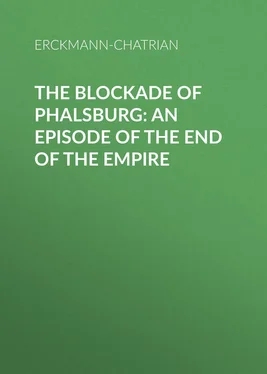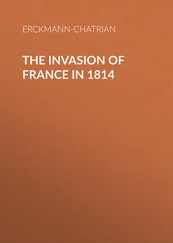Erckmann-Chatrian - The Blockade of Phalsburg - An Episode of the End of the Empire
Здесь есть возможность читать онлайн «Erckmann-Chatrian - The Blockade of Phalsburg - An Episode of the End of the Empire» — ознакомительный отрывок электронной книги совершенно бесплатно, а после прочтения отрывка купить полную версию. В некоторых случаях можно слушать аудио, скачать через торрент в формате fb2 и присутствует краткое содержание. Жанр: foreign_antique, foreign_prose, Историческая проза, на английском языке. Описание произведения, (предисловие) а так же отзывы посетителей доступны на портале библиотеки ЛибКат.
- Название:The Blockade of Phalsburg: An Episode of the End of the Empire
- Автор:
- Жанр:
- Год:неизвестен
- ISBN:нет данных
- Рейтинг книги:4 / 5. Голосов: 1
-
Избранное:Добавить в избранное
- Отзывы:
-
Ваша оценка:
- 80
- 1
- 2
- 3
- 4
- 5
The Blockade of Phalsburg: An Episode of the End of the Empire: краткое содержание, описание и аннотация
Предлагаем к чтению аннотацию, описание, краткое содержание или предисловие (зависит от того, что написал сам автор книги «The Blockade of Phalsburg: An Episode of the End of the Empire»). Если вы не нашли необходимую информацию о книге — напишите в комментариях, мы постараемся отыскать её.
The Blockade of Phalsburg: An Episode of the End of the Empire — читать онлайн ознакомительный отрывок
Ниже представлен текст книги, разбитый по страницам. Система сохранения места последней прочитанной страницы, позволяет с удобством читать онлайн бесплатно книгу «The Blockade of Phalsburg: An Episode of the End of the Empire», без необходимости каждый раз заново искать на чём Вы остановились. Поставьте закладку, и сможете в любой момент перейти на страницу, на которой закончили чтение.
Интервал:
Закладка:
As soon as my letter was gone, I wished I could bring it back, but it was too late. I kept a good face before my wife, and said, "It will all do well! We shall gain double, triple, etc."
She, too, kept a good face, but we both had misgivings; and during the six weeks necessary for the receipt of the acknowledgment and acceptance of my order, and the arrival of the spirits of wine, every night I lay awake, thinking, "Moses, you have lost everything! You are ruined from top to toe!"
The cold sweat would cover my body. Still, if any one had come to me and said, "Be easy, Moses, I will relieve you of this business," I should have refused, because my hope of gain was as great as my fear of loss. And by this you may know who are the true merchants, the true generals, and all who accomplish anything. Others are but machines for selling tobacco, or filling glasses, or firing guns.
It all comes to the same thing. One man's glory is as great as another's. This is why, when we speak of Austerlitz, Jena or Wagram, it is not a question of Jean Claude or Jean Nicholas, but of Napoleon alone; he alone risked everything, the others risked only being killed.
I do not say this to compare myself with Napoleon, but the buying of these twelve pipes of spirits of wine was my battle of Austerlitz.
And when I think that, on reaching Paris, Napoleon had demanded four hundred and forty millions of money, and six hundred thousand men ! and that then everybody, understanding that we were threatened with an invasion, undertook to sell and to make money at any cost, while I bought, unhampered by the example of others – when I think of this, I am proud of it still and congratulate myself.
It was in the midst of these disquietudes that the day for the circumcision of little Esdras arrived. My daughter Zeffen had recovered, and Baruch had written to us not to trouble ourselves, for they would come to Phalsburg.
My wife then hastened to prepare the meats and cakes for the festival: the bie-kougel , the haman , and the schlachmoness , which are great delicacies.
On my part, I had tested my best wine on the old Rabbi Heymann, and I had invited my friends, Leiser of Mittelbronn and his wife Boûné, Senterlé Hirsch, and Professor Burguet. Burguet was not a Jew, but he was worthy of being one on account of his genius and extraordinary talents.
When a speech was wanted in the Emperor's progress, Burguet made it; when songs were needed for a national festival, Burguet composed them between two sips of beer; when a young candidate for law or medicine was perplexed in writing his thesis, he went to Burguet, who wrote it for him, whether in French or in Latin; when fathers and mothers were to be moved to tears at the distribution of school prizes, Burguet was the man to do it; he would take a blank sheet of paper, and read them a discourse on the spot, such as nobody else could have written in ten years; when a petition was to be made to the Emperor or prefect, Burguet was the first man thought of; and when Burguet took the trouble to defend a deserter before the court-martial at the mayoralty, the deserter, instead of being shot on the bastion of the barracks, was pardoned.
After all this, Burguet would return and take his part in piquet with the little Jew, Solomon, at which he always lost; and people troubled themselves no more about him.
I have often thought that Burguet must have greatly despised those to whom he took off his hat. Yes, to see the fellows putting on important airs because they were rural guard or secretary of the mayoralty, must have made a man like him laugh in his sleeve. But he never told me so; he knew the ways of the world too well.
He was an old constitutional priest, a tall man, with a noble figure and very fine voice; the very tones of it would move you in spite of yourself. Unfortunately, he did not take care of his own interests; he was at the mercy of the first comer. How many times I have said to him:
"Burguet, in heaven's name, don't get mixed up with thieves! Burguet, don't let yourself be robbed by simpletons! Trust me about your college expenses. When anybody comes to impose upon you I will be on the spot; I will pay the bills and hand you the account."
But he did not think of the future, and lived very carelessly.
I had thus invited all my old friends for the morning of the twenty-fourth of November, and they all came to the festival.
The father and mother, with the little infant, and its godfather and godmother, came early, in a large carriage. By eleven the ceremony had taken place in our synagogue, and we all, in great joy and satisfaction, for the child had not uttered a cry, returned together to my house, which had been made ready beforehand – the large table on the first floor, the meats in their pewter dishes, the fruits in their baskets – and we had begun in great glee to celebrate the happy day.
The old Rabbi Heymann, Leiser, and Burguet sat at my right, my little Sâfel, Hirsch, and Baruch at my left, and the women Sorlé, Zeffen, Jételé, and Boûné, facing us on the other side, according to the command of the Lord, that men and women should be separate at festivities.
Burguet, with his white cravat, his handsome maroon coat and his ruffled shirt, did me honor. He made a speech, raising his voice and making fine gestures like a great orator – telling of the ancient customs of our nation, of our religious ceremonies, of Paeçach (the feast of Passover), of Rosch-haschannah (the New Year), of Kippour (the day of expiation), like a true Ied (Jew), thinking our religion very beautiful and glorifying the genius of Moses.
He knew the Lochene Koïdech (Chaldaic) as well as a bal-kebolé (cabalistic doctor).
The Saverne people turned to their neighbors and asked in a whisper:
"Pray, who is this man who speaks with authority, and says such fine things? Is he a rabbi? Is he a schamess (Jewish beadle)? or is he the parness (civil head) of your community?"
And when they learned he was not one of us, they were astonished. The old Rabbi Heymann alone was able to answer him, and they agreed on all points, like learned men talking on familiar subjects and conscious of their own learning.
Behind us, on its grandmother's bed, inside of the curtains, slept our little Esdras, with his sweet face and little clinched hands – slept so soundly, that neither our shouts of laughter, nor the talking, nor the sound of the glasses could wake him. Sometimes one, sometimes another, went to look at him, and everybody said:
"What a beautiful child! He looks like his grandfather Moses!"
That pleased me, of course; and I would go and look at him, bending over him for a long while, and finding a still stronger resemblance to my father.
At three o'clock, the meats having been removed and the delicacies spread upon the table, as we came to the dessert, I went down to find a bottle of better wine, an old bottle of Rousillon which I dug out from under the others, all covered with dust and cobwebs. I took it up carefully and placed it among the flowers on the table, saying:
"You thought the other wine very good; what will you say to this?"
Then Burguet smiled, for old wine was his special delight; he stretched up his hand and exclaimed:
"Oh! noble wine, the consoler, the restorer and benefactor of poor men in this vale of misery! Oh, venerable bottle, thou bearest all the signs of old nobility!"
He said this with his mouth full, and everybody laughed.
I asked Sorlé to bring the corkscrew.
As she was rising, suddenly trumpets sounded without, and we all listened and asked, "What is that?"
At the same time the sound of many horses' steps came up the street, and the earth and the houses trembled under an enormous weight.
Читать дальшеИнтервал:
Закладка:
Похожие книги на «The Blockade of Phalsburg: An Episode of the End of the Empire»
Представляем Вашему вниманию похожие книги на «The Blockade of Phalsburg: An Episode of the End of the Empire» списком для выбора. Мы отобрали схожую по названию и смыслу литературу в надежде предоставить читателям больше вариантов отыскать новые, интересные, ещё непрочитанные произведения.
Обсуждение, отзывы о книге «The Blockade of Phalsburg: An Episode of the End of the Empire» и просто собственные мнения читателей. Оставьте ваши комментарии, напишите, что Вы думаете о произведении, его смысле или главных героях. Укажите что конкретно понравилось, а что нет, и почему Вы так считаете.












